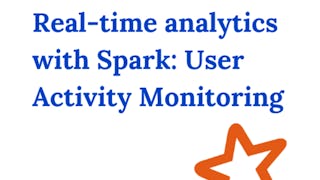In the world of big data, the significant growth in both the sheer volume and variety of data has presented significant challenges. Apache HBase has emerged as a robust and scalable solution. HBase is a powerful, distributed, and scalable NoSQL database designed to handle large amounts of data while maintaining high performance.

Gain next-level skills with Coursera Plus for $199 (regularly $399). Save now.

Real-Time Big Data Access using HBase: Boosting Performance

Instructor: Sandeep Agarwal
Included with
Recommended experience
Skills you'll gain
Details to know

Add to your LinkedIn profile
15 assignments
See how employees at top companies are mastering in-demand skills

There are 3 modules in this course
In this module, you will first be introduced to your instructor and the course. Then, we will delve into HBase, exploring NoSQL Databases, HDFS, HBase Architecture and components, and HBase clusters. We'll compare HBase with other big data landscapes, and discuss creating effective data modeling and schema design.
What's included
11 videos6 readings5 assignments2 discussion prompts2 ungraded labs2 plugins
In this module, we will discuss importing data to HBase using Sqoop, and explore querying techniques such as Scans, Filters, and Get requests, then practice constructing HBase queries in a lab environment. We will take a look at advanced querying using a Java application, and optimizing HBase performance using caching and scan optimization. Lastly, we will discuss manipulating data using batch operations for improving performance.
What's included
11 videos4 readings5 assignments1 discussion prompt3 ungraded labs1 plugin
In this final module, we will discuss HBase data modelling for real-time applications, delving into strategies and use cases. We will also explore deployment strategies for real-time applications, starting with best practices and applying it in a lab environment. Lastly, we will take a look at HBase scalability and availability in real-time applications, discussing limitations and techniques for analyzing performance, before practicing what you have learned.
What's included
9 videos4 readings5 assignments2 ungraded labs1 plugin
Instructor

Offered by
Explore more from Data Management
 Status: Free Trial
Status: Free TrialUniversity of Illinois Urbana-Champaign
 Status: Free Trial
Status: Free Trial Status: Free Trial
Status: Free TrialJohns Hopkins University
 Status: Free
Status: Free
Why people choose Coursera for their career





Open new doors with Coursera Plus
Unlimited access to 10,000+ world-class courses, hands-on projects, and job-ready certificate programs - all included in your subscription
Advance your career with an online degree
Earn a degree from world-class universities - 100% online
Join over 3,400 global companies that choose Coursera for Business
Upskill your employees to excel in the digital economy
Frequently asked questions
To access the course materials, assignments and to earn a Certificate, you will need to purchase the Certificate experience when you enroll in a course. You can try a Free Trial instead, or apply for Financial Aid. The course may offer 'Full Course, No Certificate' instead. This option lets you see all course materials, submit required assessments, and get a final grade. This also means that you will not be able to purchase a Certificate experience.
When you purchase a Certificate you get access to all course materials, including graded assignments. Upon completing the course, your electronic Certificate will be added to your Accomplishments page - from there, you can print your Certificate or add it to your LinkedIn profile.
Yes. In select learning programs, you can apply for financial aid or a scholarship if you can’t afford the enrollment fee. If fin aid or scholarship is available for your learning program selection, you’ll find a link to apply on the description page.
More questions
Financial aid available,

